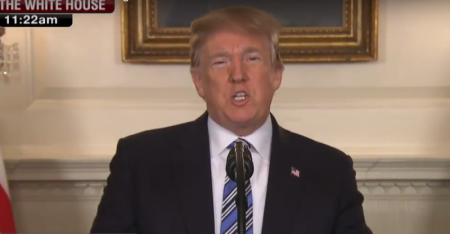'Am I Still an Evangelical If I Support Trump?'

One of the more sour fruits of the Trump presidency (although it is not entirely new) is the fad of some folks asking the question: Am I still an evangelical? The idea behind asking is that evangelicalism has somehow made itself so obnoxious and obviously benighted that a right-thinking person cannot associate themselves with it. If we ask why, then we are likely to get an answer associated with politics.
More recently, the inquirer tends to feel that evangelicals (either by virtue of something a famous evangelical said extolling Trump's Christian virtue or the fact that the group voted lopsidedly for Donald Trump) have brought dishonor upon themselves and those who would call themselves by the name.
Before I go further, let me say very quickly that there is reason to be sympathetic to the impulse some have in asking the question. Evangelicalism is associated with a form of Christianity that puts a premium upon fealty to scripture and biblically-informed living. Donald Trump, the hard-living, sharp-elbowed, thrice-married, wall-building, wild-tweeting businessman without much background in the faith, doesn't seem to fit the bill. I grant that there is reason for concern, at least, that evangelicals find themselves tied to the president at the hip in the public mind.
The perception isn't exactly fair, I should add, though, as those who wish to study the matter would find that church-going evangelicals were not strong supporters of Donald Trump in the GOP primaries. And while they did largely back him in the general election, it was in the face of a binary choice between Trump and Hillary Clinton as the face of a Democratic party that is increasingly secular, pro-choice on abortion, and belligerent toward conservative Christians, their institutions, and religious liberty. Voting against Hillary can't fairly be taken to mean that evangelicals necessarily embrace the president in a holistic way. The better sense would be that they appreciate a lot of what his election seems to have spared them.
But why do I call the "Am I still an evangelical?" question wrong-headed? The answer is that evangelicalism is not something determined by politics. I would offer a definition for evangelicals that goes something like the following: An evangelical Christian believes . . .
1. Jesus Christ is the son of God.
2. He was born of a virgin.
3. He lived a sinless life.
4. Jesus was executed by the Roman empire and died for our sins.
5. He was physically resurrected and was seen by witnesses.
6. His resurrection confirmed his identity.
7. The Bible is trustworthy.
8. The Reformation critique of Rome offered an important corrective to a variety of theological and institutional missteps.
If you believe these things, then I would say it is very likely that you are either an evangelical or something very close to it. In American society, we contrast evangelicals to fundamentalists largely by winsomeness of attitude and a sense of engagement rather than withdrawal (though that distinction is probably becoming dated). We distinguish evangelicals from mainline Christians (think the Episcopal Church, for example) by looking to the much greater emphasis evangelicals place upon the authority of scripture and the reality of Biblical supernaturalism. We separate evangelicals from Catholics largely on the basis of their views of hierarchy, the place of tradition in relation to scripture as a source of authority, and the way we look at Mary.
Notable in the previous paragraph are the things that are missing. An evangelical is not a person who votes for a particular political party, who interprets social justice in a specific way, who breaks down a police shooting along certain lines, who is more open or closed on immigration, and/or who has a higher or lower desire for environmental regulation. Those are all things that evangelicals can argue about. We are seeking to be faithful to scripture, to listen to the Holy Spirit, and to see the lordship of Christ fully vindicated in our lives. Nevertheless, there is quite a bit of room to draw various conclusions about politics and current events.
For these reasons, it is inappropriate and wrong-headed to treat one's evangelicalism as some kind of personal referendum on the quality of the company one is keeping by being a member of this rather large group. If you think the Bible is only another book, then you're out. If you think Jesus was just a nice guy, you're out. But we don't choose this label (evangelical) on the basis of your position on the Paris Climate Agreement or who you thought was at fault in Ferguson.
Hunter Baker, J.D., Ph.D. is an associate professor of political science at Union University, a scholar affiliated with the Acton Institute and the Ethics and Religious Liberty Commission, and the author of three books on politics and religion.




















